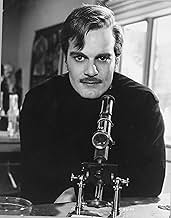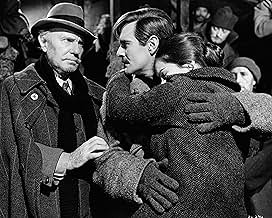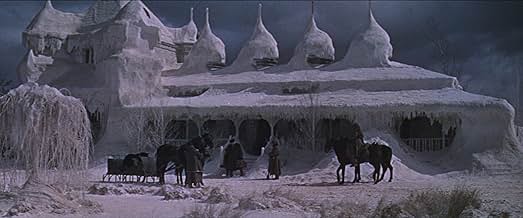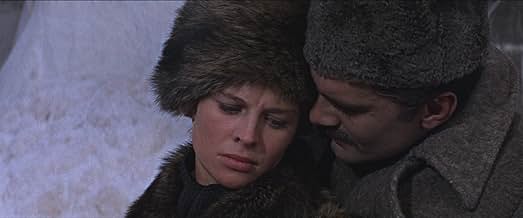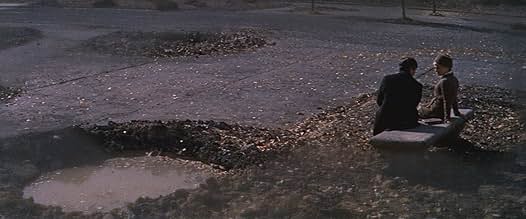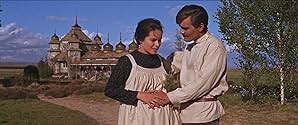La vie d'un médecin et poète russe qui, bien que marié, tombe amoureux de l'épouse d'un militant politique et connaît les vicissitudes de la Première Guerre mondiale, puis de la Révolution d... Tout lireLa vie d'un médecin et poète russe qui, bien que marié, tombe amoureux de l'épouse d'un militant politique et connaît les vicissitudes de la Première Guerre mondiale, puis de la Révolution d'Octobre.La vie d'un médecin et poète russe qui, bien que marié, tombe amoureux de l'épouse d'un militant politique et connaît les vicissitudes de la Première Guerre mondiale, puis de la Révolution d'Octobre.
- Réalisation
- Scénario
- Casting principal
- Récompensé par 5 Oscars
- 21 victoires et 13 nominations au total
- Liberius
- (as Gerard Tichy)
Résumé
Avis à la une
As materialists (matter precedes spirit, not vice versa), the Bolsheviks believed that they had found the holy grail of human progress in Marxism-Leninism, and were now able to assume the reins of history in their own hands. They believed that their violence was not only justified, but necessary, oblivious to the fact that they, too, somehow felt the angel of medieval teleology smiling over their shoulders.
In contrast to the Bolsheviks, Zhivago's ethos, if he had one, was almost identical to Kant's `categorical imperative,' which had just one axiom: treat people as ends in themselves, and not as ends to a mean. There couldn't be a sharper moral contrast.
There's a fabulous scene midway through the movie that highlights the difference in moral attitude. Dr. Zhivago confronts a communist functionary who has ordered the destruction of a village, a hamlet suspected of aiding the Mensheviks by selling them horses. To the Bolsheviks, if you weren't 100 percent behind them, you were a `counterrevolutionary,' sorta like Dubya's idea that you're either for us, or against us. And so Strelnikov, the passionate Bolshevik, glibly justifies his actions to Dr. Zhivago as easy as if he were tossing his hair aside, saying that the annihilation of the village, however cruel, is necessary to make a point. Zhivago replies: `Your point; their village.'
I love this film, a timeless epic. If there's a more beautiful heroine in all of movie-making history than Julie Christie (Lara), I'm not aware of it. And Omar Sharif is stunning as Iuri Zhivago, who heals the body with emetics, scalpels, antiseptic, and gauze, while he heals the soul with his poetry. Although the movie is three hours and 20 minutes long, the cinematography is so efficient, evocative, and densely layered that one hardly notices. This is, in my opinion, one of the best films of all time.
I also think that you should see this on the big screen back to back with Warren Beatty's Reds. Two very opposite views of the Russian Revolution, one from the inside and one from the outside. You could have a very interesting discussion on which is which.
The title character, played by Omar Sharif, is Dr. Yuri Zhivago who is both doctor and poet. He was orphaned as a child and raised in the house of Ralph Richardson and Siobhan McKenna. He marries their daughter, Geraldine Chaplin who of course he loves, but naturally like a sister.
The real passion of his life is Julie Christie who is married to a committed Bolshevik in Tom Courtenay. Courtenay is also a guy, with shall we say, some issues. She loves him in her own way though and goes to search for him when he volunteers for the army to subvert it as the Bolshevik plan was when Russia entered World War I.
Christie meets Sharif at the front and the passion ignites. But all around them the society they knew and were brought up in is crumbling about them. Their story set against the background of the Russian Revolution is what Doctor Zhivago is all about.
Zhivago knows change was inevitable, the old order in Russia was ready to be toppled. But he's a poet and not one to let his art be subverted for the sake of the state. Fortunately he's also a doctor and his services are needed, in fact the Bolsheviks rather brutally insist on his accompanying one of their brigades as a medical officer.
I still remember as a lad the acclaim Boris Pasternak's novel got world wide when it was published while being banned in his home land. After winning the Nobel Prize for Literature, Pasternak died shortly thereafter. It's a pity he did not live to see this film, I think he would have approved.
From the deserts of Arabia to the steppes of Russia, David Lean certainly knew how to direct a film that involved vastness. Yet the people of his stories be it Lawrence of Arabia or Doctor Zhivago never get lost in the spectacle. Lean makes you care about the characters that Pasternak created, you get involved in the romance of Sharif and Christie, you want to know if they'll make it in this country undergoing revolutionary convulsions.
Other performances of note are Alec Guinness as Sharif's half brother Yevgeny Zhivago, a committed Bolshevik himself and Rod Steiger as the opportunistic Komorovsky.
Doctor Zhivago won a host of awards in several technical categories, strangely enough it wasn't nominated for Best Picture in 1965 though. It is a classic and even now with the Soviet Union a memory, I doubt if even a Russian made remake of Zhivago could equal what David Lean and his wonderful cast gave us in 1965.
The film is a sweeping saga of several people during the period of the Russian Revolution--both before and after. I could summarize the film but considering that there are already over 200 reviews, I'll spare you. At three hours and twenty minutes, oddly, not a lot seemed to occur in the film. I am not complaining or saying it was dull, as it was a lovely film--with very nice cinematography and music. It's just that the film is the type that slowly and deliberately unfolds--and the more hyperactive might not find that to their liking. The acting is quite nice but I think the real star is the direction. My only reservation is that with the great romance between Zhivago (Omar Sharif) and Lara (Julie Christie)--they both were married and Zhivago's wife (Geraldine Chaplin) was a lovely person. This did make it difficult for me to care about the characters more. Still, it's a lovely spectacle and well worth your time.
This is a great movie. It is long. It is memorable. But it is neither a soap opera nor foolish. It is not a documentary of Russia in WW1 and then going communist. It is a life and love story against a backdrop of these things. Critics should accept what a movie is about, rather than what they wish it were about.
A movie like this, like all epics, gets a chance to show detail and immerse you in the environment. I never felt so chilled, and so bothered by the wind--all in my head--as during watching this film. In that way, actually feeling like you were there, has only been as realized for me in one other film, "The Last Picture Show", where the feel of chill and desolation in that movie is pervasive.
All performances are great, don't let the idiots tell you otherwise. I read that many felt the Sharif was wrong, or expressionless. Sorry, but that is his character. He is trying to be a professional physician, and keep the appropriate facade in the face of changes that are absolutely surreal. Christie possesses the kind of visual magnetism that makes the infatuation of Zhivago plausible. Rod Steiger, who is guilty of preposterous performances in other films, hits the keys of his performance so perfectly you never disbelieve him. Lesser actors would have just made him the perverted rapist that he is, but nothing more to add to the dynamics of his personality. Courtney as high-minded, full of foolishness, and in the end, blinded by frustration and I believe a touch of madness.
Another thing I found splendid about this film was how it illuminated how evil, twisted, and preposterous the scheme of communism truly is. In this film, and of course in history, all the wealth of the rich is removed, and redistributed. This fixes nothing. What it does allow for, in its BS concepts that all men are the same and are all "comrades", is that you don't rise due to merit, you rise because of who you know. The movie time and again shows complete idiots in charge of things...the "managers" of the old Zhivago house who have converted into mass housing for the jealous poor who hate Zhivago and his family. They couldn't be more useless. The leaders of various combat units. The guy who tells people on the disgusting train about the "features" of the accommodations. Yes, in communist countries, the cream never does rise to the top. The working class does whatever is told, just for the benefit of the scraps and their survival. Lara at one point states something like "it's a horrible time to be alive"....and nothing is closer to the truth than that.
Again, not documentary or a wartime story, but its concepts and truths are right there.
The production, of course, top notch. Watch it, take a break or two and soak it all up. It is a special kind of movie, back when they made such a thing.
"Doctor Zhivago" is definitely one of his most outstanding works, a film that breathes with life, and suffers with passion. Neither, though, of the credited people can take as much credit for it, as David Lean. Omar Sharif delivers one of his best performances of his career, Julie Christie has never been as stunning, or Rod Steiger as Komarovsky or Tom Courtenay as Antipov ever left more memorable performances than these ones. Not even Maurice Jarre, who composed one of the most unforgettable themes in film history, or Robert Bolt, for his skillful adaptation on Pasternak's difficult novel, not even Freddy Young's cinematography, can rise above the vibration of genius, which is David Lean. We almost feel the complexity of the universe collapsing on us with a mad power that we instantly become part of it, and fall in love with all its particles.
For those who haven't seen the film, this might make little sense, and it can give a misleading understanding of what one is to expect. "Doctor Zhivago" is a poet, who at the beginning of the 20th Century is caught in the historical Bolshevik revolution. An outstanding doctor, married to his childhood friend, Tonya (Geraldine Chaplin in a warm performance), finds that there is beauty beyond deceit, love beyond commitment, by starting an affair with an enigmatic lady which appears often in his path in the most unnoticeable of moments. Their destiny is as confused as Russia in the turmoil started by the Reds, it is shaped by history without their approval. There is no solution for a country that abandoned its passions in its desire of self-improvement, just as for the two lovers, which find themselves abandoned in the middle of the Siberian taiga.
This is a slow film and for the good reasons. We are allowed to breathe the story, to give it momentum, and to judge it from within, as if the choices were not Yury's, Lara's or Tonya's, but our own creation. And this is the brilliance of Lean's direction. The story transcends time and space, and it melts within the triviality of our life. Beyond it, we are left with nothing but love, pure and blindingly real.
Le saviez-vous
- AnecdotesThis movie wasn't shown in Russia until 1994.
- GaffesThe little girl who plays Tonya at Yuri's mother's funeral starts to cross herself in the Roman Catholic manner, but quickly corrects herself and finishes in the Russian Orthodox style.
- Citations
Komarovski: Lara, I am determined to save you from a dreadful error. There are two kinds of men, and only two, and that young man is one kind. He is high-minded. He is pure. He is the kind of man that the world pretends to look up to and in fact despises. He is the kind of man who breeds unhappiness; particularly in women. Now, do you understand?
Lara: No.
Komarovski: I think you do. There's another kind. Not high-minded. Not pure. But alive. Now that your taste at this time should incline towards the juvenile is understandable. But for you to marry that boy would be a disaster. Because there's two kinds of women...
[Lara covers her ears, he forces her arms down]
Komarovski: There are two kinds of women and you - as we well know - are not the first kind.
[Lara slaps him, he slaps her back]
Komarovski: You, my dear, are a slut.
Lara: I am not!
Komarovski: We'll see.
- Versions alternativesWhen it was first released, the film originally ran 197 minutes. Early in its run, David Lean and editor Norman Savage shortened it to 180 minutes; this version was in circulation for years. By the mid-1990s, the uncut version was restored.
- ConnexionsEdited into Hollywood: The Dream Factory (1972)
Meilleurs choix
Détails
- Date de sortie
- Pays d’origine
- Site officiel
- Langues
- Aussi connu sous le nom de
- Doctor Zhivago
- Lieux de tournage
- Morley Flats, Alberta, Canada(Frozen house longshots)
- Sociétés de production
- Voir plus de crédits d'entreprise sur IMDbPro
Box-office
- Budget
- 11 000 000 $US (estimé)
- Montant brut aux États-Unis et au Canada
- 111 721 910 $US
- Montant brut mondial
- 112 089 403 $US
- Durée3 heures 17 minutes
- Couleur
- Rapport de forme
- 2.35 : 1
Contribuer à cette page








